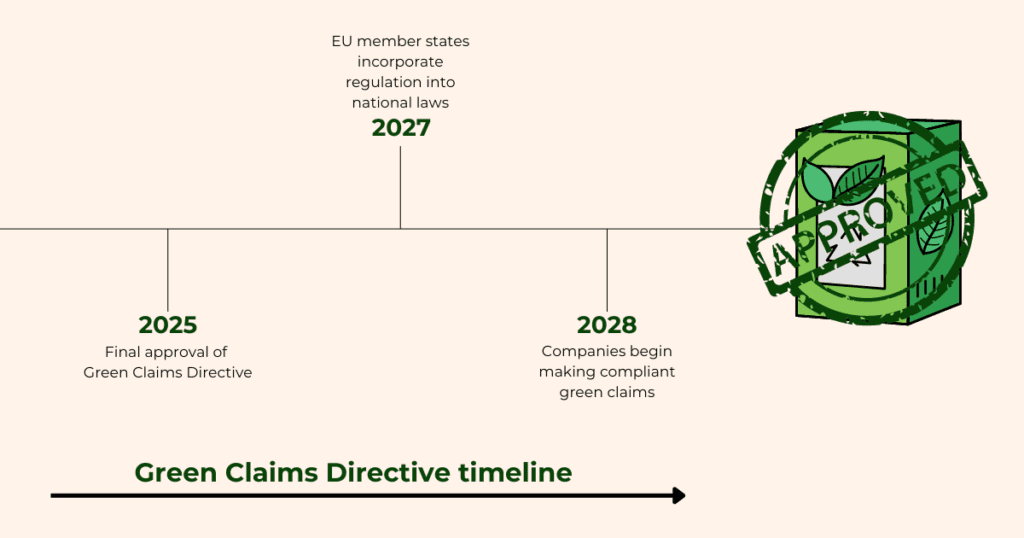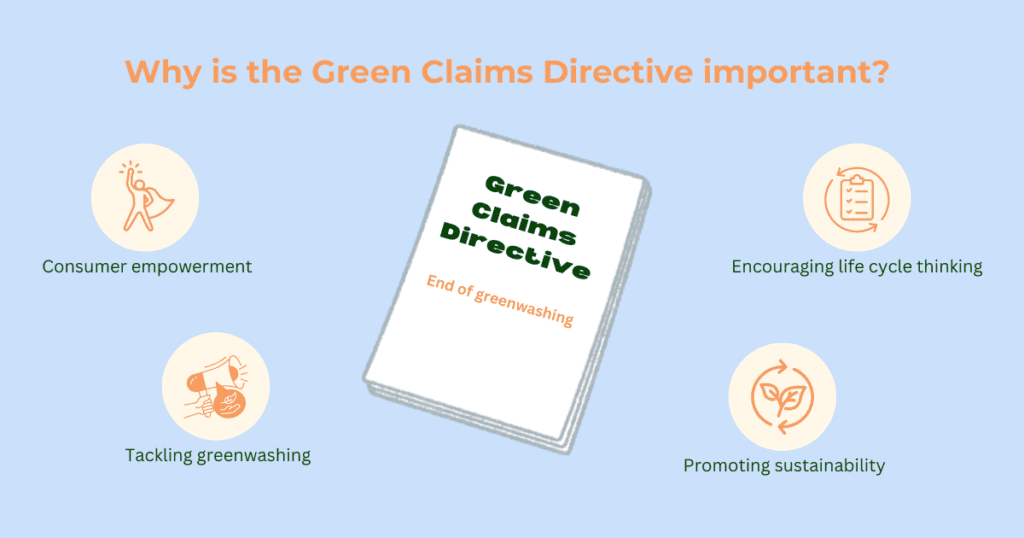The Green Claims Directive - everything you need to know
Have you ever come across a green claim on a product like ‘eco-friendly’ or ‘carbon neutral’ and thought, ‘Really, though? Can I trust this?’ You’re not alone. The European Union is asking the same question, and in response, they’ve introduced the Green Claims Directive. This new regulation ensures that businesses’ green claims aren’t just marketing slogans but are backed by genuine, verifiable data.
The Green Claims Directive marks a significant shift in how companies communicate their sustainability efforts. Vague, unverified claims are no longer acceptable. Instead, businesses must now provide robust, scientific evidence to support their claims.
In this blog, we explore what a green claim is, dive into the key elements of the Green Claims Directive, and explain why it’s so important. Plus, we’ll walk you through how companies can prepare to create compliant green claims and how SaaS solutions like automated Life Cycle Assessment (LCA) platforms can make creating trustworthy green claims easier.
PUBLISHED: 27 June 2024
WRITTEN BY: Charlie Walter
Table of contents
- What is a green claim?
- What is the Green Claims Directive?
- Key parts of the Green Claims Directive
- Green Claims Directive timeline
- Why is the Green Claims Directive important?
- How can companies prepare for compliance with the Green Claims Directive?
- How can automated LCA platforms help with compliance?
- We can help
What is a green claim?
A green claim is any statement, message, or claim made by a company that implies that its product, service or the business itself has:
- A positive environmental impact.
- No negative environmental impact.
- A reduced negative impact compared to competitors.
- A reduced negative impact compared to previous product versions.
Some examples of green claims include:
- A beauty brand claiming their packaging is made from recycled materials and is fully biodegradable.
- A fashion brand releasing a ‘conscious’ line that uses more sustainable fibres.
- A tech company highlighting that it has achieved carbon neutrality by investing in reforestation projects and renewable energy.
In theory, this sounds fantastic – who doesn’t want to hear about a company’s sustainability efforts?
Issues arise when these claims are not backed up by robust and verified evidence. Sometimes, green claims are vague or even worse misleading. This is commonly referred to as greenwashing, which is when companies make unsubstantiated sustainability claims to sell their products or services.
As businesses increasingly want to highlight their sustainability initiatives, it’s vital that these claims are verified. Stakeholders like consumers and investors need to know what’s real versus clever marketing. That’s where the Green Claims Directive steps in, ensuring that businesses substantiate their claims with robust, verifiable evidence.
What is the Green Claims Directive?
The Green Claims Directive is a pivotal regulation from the European Union designed to combat the growing issue of greenwashing. The recently passed regulation aims to prevent misleading or false advertising about products’ sustainability benefits.
Think of it as the new playbook for making green claims in the EU. Any company, whether based in or outside the EU, making business-to-consumer green claims that target EU consumers about their products or services must now back up those claims with accurate, verifiable data. The directive sets clear criteria, ensuring businesses provide transparent, verified and comparable evidence to support their claims.
This directive is part of the broader European Green Deal strategy, which aims to eliminate greenwashing, empower consumers to make informed, sustainable choices, and hold businesses accountable for their claims.
Key parts of the Green Claims Directive
The Green Claims Directive is a comprehensive regulation with a broad scope. Let’s break down some of the key components of this directive:
Verification requirements
An independent third party must verify a green claim. This means they will ensure that the data is accurate and transparent. While small businesses are exempt from mandatory verification, they are still encouraged to verify their claims using a third party. Simply stating a product is ‘sustainable’ isn’t enough anymore – companies must have the data to back it up, and it needs to be checked by an impartial organisation before reaching consumers.
Banned language
Vague, generic phrases like ‘environmentally friendly’ or ‘carbon friendly’ will be banned unless backed by solid evidence. This eliminates language that often misleads consumers, such as ‘conscious’ fashion lines. A list of banned phrases can be found here.
Carbon credits
One of the most notable aspects of the Green Claims Directive is its stance on carbon credits. Companies must disclose when they use carbon credits to offset emissions as part of their green claims. This prevents companies from using carbon credits to cover unsustainable practices.
Environmental labels
The Green Claims Directive also puts a spotlight on environmental labelling schemes, requiring them to be transparent and verified by third parties. Any new environmental labels introduced within the EU must be approved to ensure they create genuine value.
Green Claims Directive timeline
Now, you might be wondering: when will all this come into force?
The Green Claims Directive is currently in the final stages of approval, with negotiations continuing into 2024. Once a final agreement is reached, likely by 2025, EU member states will have two years to incorporate it into their national laws.
Businesses will then have an additional year to comply, making 2028 the target year for full compliance. While that might seem a while away, it’s wise to start preparing now to stay ahead.
Importantly, smaller businesses with fewer than ten employees and less than €2 million in annual turnover are exempt from this regulation. However, they can voluntarily opt in if they would like to comply with it.

Why is the Green Claims Directive important?
There are numerous benefits of the Green Claim Directive, including:
Consumer empowerment
The directive ensures that when a company claims its product has environmental sustainability credentials, such as being recyclable, consumers can trust the claim. This empowers consumers to make informed choices without second-guessing the legitimacy of the claims.
Tackling greenwashing
Did you know that 40% of green claims in Europe last year were unsubstantiated? The Green Claims Directive directly targets the issue of greenwashing as it makes it very difficult for companies to exaggerate or fabricate their sustainability credentials. This levels the playing field, giving a competitive edge to businesses that are genuinely committed to sustainability.
Promoting sustainability
The directive encourages businesses to focus on robust, evidence-backed sustainability efforts by tightening the rules on green claims. Rather than relying on vague or misleading marketing, companies will need to create real, measurable positive impact.
Encouraging life cycle thinking
The directive encourages companies to provide data on the full life cycle of products they make green claims about (we’ll explore this in more detail later in the blog). This approach highlights the value of conducting Life Cycle Assessments (LCA) to give businesses a comprehensive understanding of their environmental impact and generate the necessary data to support compliant green claims.
The key takeaway? This regulation isn’t just about cracking down on misleading claims – it’s a vital step toward a more transparent and sustainable future for businesses and consumers.

How can companies prepare for compliance with the Green Claims Directive?
So, where should companies begin when creating compliant green claims? Below are the key steps to get started:
Audit your current green claims
Start by reviewing the green claims you’re already making. Are they vague or misleading? Do you have solid evidence to back them up? By auditing your existing claims, you can identify which ones need further substantiation or need to be removed.
Gather environmental data
For the product in your green claims, collect comprehensive environmental data across the products’ life cycle. This includes raw material extraction, manufacturing, transportation, usage and end-of-life. The more data you have, the easier it will be to provide the evidence needed for your green claims.
Use a science-based approach to evidence claims
Ensure your claims are backed by robust, scientific evidence. This often means using a Life Cycle Assessment (LCA) approach to collect data on the product’s environmental impact throughout its life cycle. Make sure you’re using the same consistent methodology across your green claims, and disclose whether carbon credits or environmental labels are used as part of the green claim.
Verify your claims
Once your claims are substantiated, they’ll need to be verified by an independent third party before you can use them in marketing. Choose a trusted company and make sure your claims meet the Green Claims Directive’s standards.
Stay informed
The Green Claims Directive is still evolving, and requirements are being finalised. Stay up to date with any changes to the directive, and adjust your claims as needed to stay compliant.
Non-compliance can result in fines, damage to brand reputation and loss of stakeholder trust.
How can automated LCA platforms help with compliance?
While the Green Claims Directive doesn’t mandate Life Cycle Assessment (LCA), it requires businesses to thoroughly understand and have detailed data on a product’s environmental impact throughout its life cycle. Conducting LCAs aligns with this requirement by providing the life cycle data needed to create green claims that are compliant with the regulation.
Automated platforms like Root streamline this process by generating thousands of life cycle assessments across entire product portfolios, enabling businesses to produce the evidence needed to support green claims efficiently.
Root’s LCA platform helps companies comply with the Green Claims Directive by:
- Quantifying Impacts: Root gathers essential environmental data for each stage of a product’s life cycle, ensuring compliance with the directive.
- Identifying Hotspots: Root pinpoints areas of significant environmental impact in a product’s life cycle, allowing businesses to focus on improvement and maintain ongoing compliance.
- Ensuring Transparency: Root provides transparent, verifiable data that meets third-party verification standards and aligns with ISO 14040/14044, supporting trustworthy green claims.
We can help
Root’s vision is to redefine the norm by making product footprints universal. Our platform conducts LCA for all products, helping businesses report effectively on regulations, avoid greenwashing, become industry leaders and grow.
Root partners with companies to make green claims that are compliant with the Green Claims Directive. By using Root’s platform, businesses can ensure their green claims are backed by robust, scientific and third-party validated data, complying with the directive’s requirements.
Interested to learn more? Get in touch with our team to discover how Root can help you achieve compliance and drive sustainable growth.
